Banners Broker Scam Update
UPDATE 28/2/2013: Just days ago, BannersBroker announced the reopening of their Indian office in Goa after ‘the conclusion of a police investigation’. Once again, they have been caught lying. Click here to read the full court order, which explicitly states that the company’s accounts are frozen, and their assets remain in police custody.
UPDATE 29/1/2013: I have just posted a full Q&A session with Terry Stern, the International Public Relations Director representing Banners Broker.
BREAKING NEWS 31/12: Banners Broker’s Goa office has been raided and shut down by the police. The company has been charged under IPC section 4, 5 and 6 of the PCMC (banning) act 1978, 406 and 420. Full announcement here.
UPDATE 4/1: Amid growing speculation over the future of Banners Broker India, CEO Chris Smith has cancelled the company’s ‘World Tour’ that was originally planned to reach Kolkata in February. Smith insisted that Banners Broker is ‘fine’ during his Friday conference call. He blamed ‘a little mischief’ from an ex-employee for the criminal charges brought against the company. The investigation is still ongoing, and the Banners Broker Goan office remains closed. More information here.
* * *
In October, I made a post about Banners Broker being a suspected ponzi scheme. To say that the post has gone viral would be a massive understatement. It is currently drawing several thousand hits per day, with 357 comments and counting.
My Hate Mail has also been buzzing left, right and center.
While that initial post was designed to raise awareness of the scam, critics have said – quite rightly – that it doesn’t offer enough evidence to say, beyond any shadow of a doubt, that the program is a ponzi scheme.
Personally, I wasn’t expecting there to even be a debate. It’s pretty obvious what Banners Broker is.
But perhaps I am guilty of overlooking the fact that most people who invest in Banners Broker have no exposure to the real online advertising industry. It is not so obvious without that first-hand experience.
I’ve decided to release this second post to provide a more cohesive look at why Banners Broker stinks, and how we can make such assumptions about it being a ponzi scheme without a single piece of ‘definitive’ proof.
If you haven’t read the first Banners Broker Scam article, I suggest you start there.
Banners Broker in the Media
Before I get in to the evidence and lies, I want to address a common misconception that it is only small-time bloggers who are posting negatively about Banners Broker.
The BB apologists seem intent on tarring us all as sad-acts who have nothing better to do than watch and wait for a good thing’s demise.
I prefer to call it an investment in the public interest. Many people are going to be harmed by the collapse of Banners Broker, and it is not just bloggers who are taking notice.
The Irish media has devoured the fanciful business model after leaders Rajiv Dixit, Chris Smith and co rolled in to town for a gala last month.
Here’s some of the press coverage:

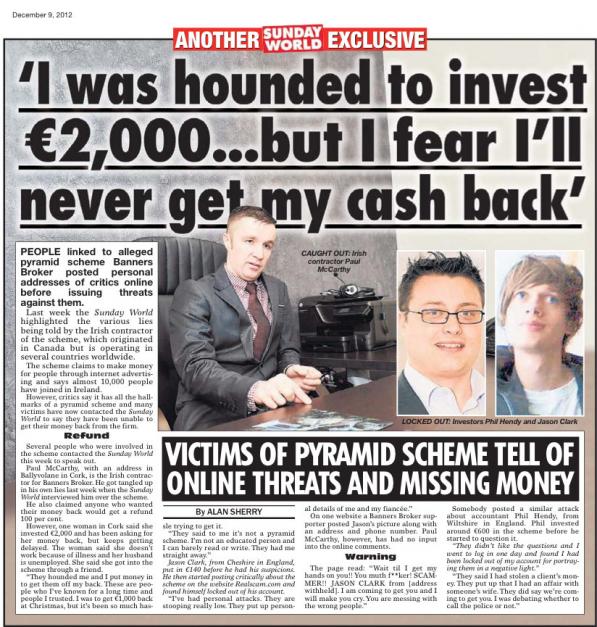
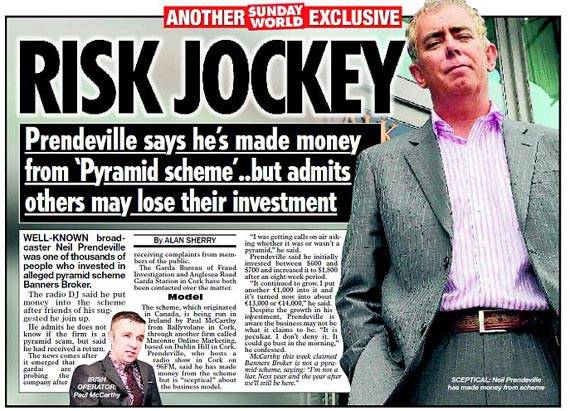
The next time Banners Broker tells you that the negative criticism comes from ‘bloggers with hate agendas’, feel free to ask whether they consider the Sunday World (a major Irish red-top with over 1 million readers per week) in that same category.
The History of Banners Broker
The Banners Broker you see before you today, the alleged worldwide advertising force, is quite a radical leap from the Banners Broker that was announced to the HYIP scene in 2010. Here’s Kul Josun explaining the origins of the program in a very old and very revealing video:
http://www.youtube.com/watch?v=e1e5KGw87QI
“Banners Broker: Welcome to the worlds first cycler doubler, where you can double your money without signing up one person. Join for free and change your future today.”
To all the commenters in the last post who asked for a definitive piece of evidence that Banners Broker is a ponzi scam, this might as well be it. Upon launching, they branded themselves to the notorious HYIP community as the world’s first ‘straightline’ cycler doubler.
What this means is that your payouts come from within the system (cycled) directly from sign-ups below you (a straight line).
Here’s a fun task for you:
Go to Google, and search “straightline cycler doubler“.
Here you will find a revealing look in to the world of Banners Broker before the modern narrative of an online advertising network.
Look at the early press releases, look at the very first forum posts, look at the YouTube videos. Tell me it doesn’t stink.
Now tell me why this company should be considered in the same breath as real online ad companies.
Why did Banners Broker brand themselves as a moneymaking system to the HYIP community when the nature of their alleged business model (if it were true) would be more fitting on TechCrunch?
“Banners Broker Uncovers Industry Shaking Algorithm; Banner Ads Never to be the Same Again!” (Yeah, I never saw that headline either.)
The answer is because Banners Broker’s roots are tied to the shadiest realms of HYIP. Recycled cash is the real source of their revenues, not an industry-changing algorithm in the online advertising space. And that’s why Banners Broker pitched their company directly to the kind of individuals who would be looking to invest in it: amateur investors a few small worlds away from Silicon Valley.
To put it simply: they know the hand that feeds them.
And it is not advertisers.
My favourite part of this video is Kul laying the smack down on other HYIP programs, “The hype and maths don’t work. Period.” And yet, he brags…

Seems like a legitimate online advertising company!
Seriously people, these opportunities do not exist legally. Not in this world or the next.
Anybody who tries to convince you of such BS should be red-flagged and banished from business conversation for the rest of his days.
Before you invest in the next get-rich-quick program (or Banners Broker if you are new to the idea), consider that the world’s greatest investor – Warren Buffett – has written his name in to history by producing an average annual return of just over 20%. A staggering feat in the investment arena.
Now ask why Warren Buffett isn’t investing in the ‘stock’ of Banners Broker panels, a program that the apologists claim can deliver an upwards annual return of 300%.
The answer is because Warren Buffett prefers to work with real companies, not smiley faced Primark suits fresh off the back of a ‘World Tour’ lorry.
Chris Smith… The Man, The Myth, the Stock Photo
In the video above, you will notice that it introduces Chris Smith as the mathematical genius behind Banners Broker. Except that isn’t the same Chris Smith who can be found travelling the world today.
In fact, that Chris Smith is a stock photo that can be purchased for £18.00, which was evidently too much for “We Are Cash Rich” Banners Broker as they have cropped it above the watermark:
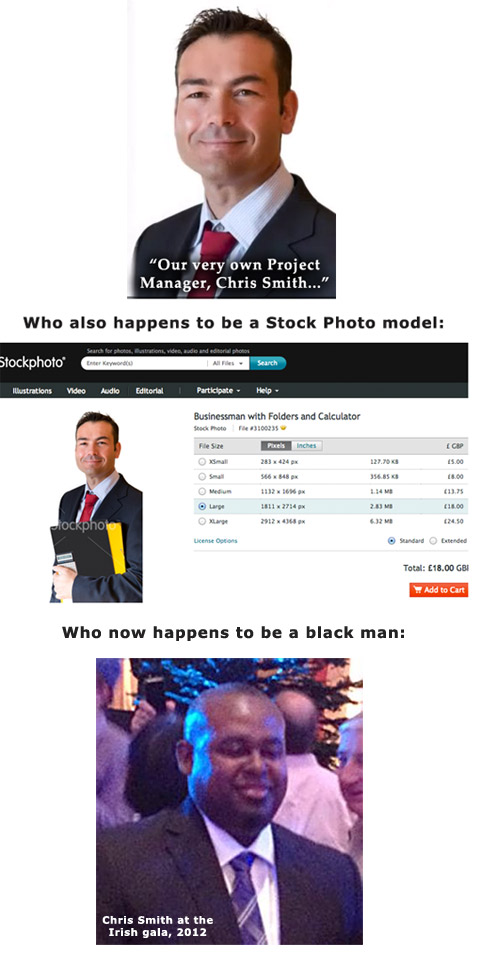
Small details, guys.
I hate to point out the sheer unprofessionalism of this company by resorting to stock photo CEOs, but it goes a long way to understanding the bigger picture. We are dealing in smoke and mirrors.
Nothing is ever what it seems with Banners Broker.
“In Defence of Banners Broker…”
You may have seen this article, Debunking the Scam, that attempts to explain – in Clickbank sales letter form – ‘how the Banners Broker model works’. It has become the Bible of Cult BB, a source that is supposed to deflect all criticism. There’s just one problem: it’s a steaming pile of you know what…
Let’s look at some of the points raised:
From Debunking the Scam
So the product of Banners Broker is: Advertising Impressions.
The end user – the advertiser, who never sees or hears of Banners Broker, gets ad space that hosts his advertising, and visitors to the various websites where that ad is displayed, see that ad.
There’s the product.
Hold on, hold on. WHAT? This is one of the stupidest defence arguments I’ve ever heard.
The advertiser never sees or hears of Banners Broker?!
That’s a pretty dumb theory considering an advertiser needs to sign up through BannersBroker.com before he can use the advertising system. Or is that just there for show?
The purpose of Banners Broker is to act as the middleman and broker ad impressions. We already know that Banners Broker gains access to publisher websites by brokering through Clicksor as a reseller (see this description).
Note here, “Selling traffic has not been this easy before. Become a Clicksor authorized reseller now and experience the simplicity in selling traffic to your advertisers.”
Clicksor provides the publishers. It’s up to Banners Broker to provide the advertisers, which is the whole god damn point of reselling. The fruitcase above has clearly not understood this when he comes out with tripe such as “the advertiser never sees or hears of Banners Broker“.
I mean, come on dude. Does the following link mean nothing to you?
http://bannersbroker.com/main/advertiser
I suppose the advertiser has to sign up wearing a blindfold then?
Or is – as I somehow suspect – the argument designed to distract our attention from the fact that not a single Banners Broker advertiser is known to exist?
Moving on to his next crazy suggestion…
From Debunking the Scam
Banners Broker is just what it says – a broker in the banner advertising field. A unique broker – unique in that no one else does what they do.
What’s a broker? The dictionary says: “a broker is a person who buys and sells goods or assets for others.”
Banners Broker “brokers” in a slightly different way than has been done before on line… here’s an overview:
There is a network of websites and advertising companies that comprise what is called the “Blind Network”(Click here for definition) (an Internet ad industry term).
Note, that I didn’t say – Banners Broker operates within a Blind Network.
They operate within T-H-E Blind Network.The same Blind Network that millions of advertisers and publishers already operate within.
The same Blind Network that successfully generates BILLIONS of Dollars of revenue every year.
This isn’t something invented by someone to trick you – it’s how the on-line advertising industry works – (so how can these so called “insiders” be inside anything but their own rear ends?)
Let me keep this short and sweet. There is no such thing as ‘THE Blind Network’.
If ‘THE Blind Network’ is real, and Banners Broker operates within ‘THE Blind Network’, who else operates in ‘THE Blind Network’? What is ‘THE Blind Network’?
And if Banners Broker is a pawn in somebody else’s ‘THE Blind Network’, what makes their business model so special that it can’t be replicated by a competitor? Ever heard of the law of competition? Unless Banners Broker took out a patent on banners, we need to have a serious adult discussion.
If we are to believe the margins – eye-watering as they are – why isn’t every single broker in the world rushing to be a part of THE Blind Network?
Answer: There is no such thing.
This idiot then goes on to contradict himself by saying that Banners Broker operates in the same Blind Network as millions of other advertisers and publishers.
So what is its competitive advantage?!
Again, no mention of what this Blind Network actually is, or who runs it… Who needs details, right?
Note on the author: Seriously, who hyphenates “on-line“? Can we really trust that this guy has departed the twentieth century? Maybe the Millenium Bug struck after all.
In a recent development, Banners Broker has debunked any suggestion that it is ‘THE Blind Network’.
The Blind network is NOT created/nor owned by BB, but controlled by 10 other brokers, including Google.
I’m sorry, but this explanation is also a pile of steaming BS. Are we to believe that Banners Broker is brokering ad sales through Google, now? Complete rubbish. Google does not need a company like Banners Broker. It has its own properties to handle publishers and advertisers: AdSense and AdWords. There is no ‘broker’ middleman.
The Choice Network… Now Comes Served With Ads (Or Does It?!)
A key point in my first post on Banners Broker was that the so-called Choice Network was no more than a damp fraudulent squib. The websites in the network clearly belonged to Banners Broker, and none of them had advertisements from legitimate companies.
Well, there must be pigs flying in the sky, because the BB apologists are telling me that the Choice Network is now fully operational, and filled with real ads from real companies.
I took a few minutes to verify their claims, and sure enough, ads from reputable companies are now displaying:
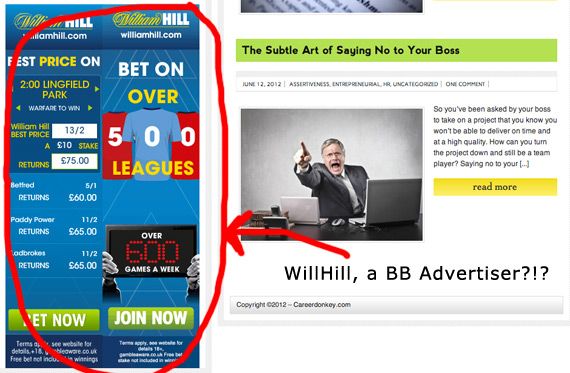
Hold on, though. Before you get excited, we should know better than to take what Banners Broker says or does at face value.
Is this advertising campaign really running through the Banners Broker Choice Network?
No, it’s not.
Banners Broker is serving these ads from ox-d.bannersbroker.com, which can be IP traced to New York City where the server is owned by OpenX Technologies:

OpenX is a powerful ad exchange that offers publishers the chance to sell their own inventory, or broker through the OpenX Market where a number of renowned brands can pick up the scraps. Brands like… WillHill.
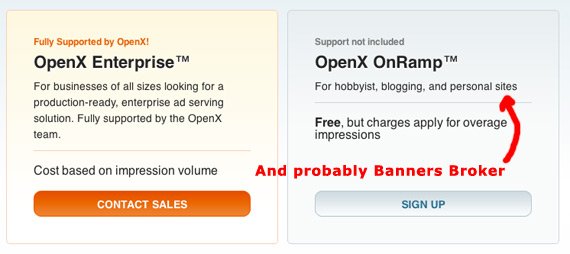
It’s debatable whether Banners Broker invested in the Enterprise Edition or the Free Version (for hobbyists), but what certainly isn’t debatable is the fact that these ads you see on the Choice Network do not come from advertisers signing up to BannersBroker.com.
They are sourced from the OpenX Market, probably as remnant traffic.
You could sign up to the same service today and have your very own ‘Choice Network’ up and running in hours.
One thing is for certain, you will soon see that actually, yes, it is possible NOT to make money with the Banners Broker system. The real one, anyway. These ads produce only an industry standard return, nothing like what would be required to turn a bunch of third party investors in to millionaires.
So, what are we to make of all those months where the Choice Network was stuck in ‘Test Mode’? I guess that’s how long it took BB’s in-house programmers to configure OpenX across their portfolio of dud sites.
Changing the face of the online advertising industry?
Yeah, that might take a while.
Note: Thanks to the helpful peeps over at RealScam for piecing together this latest lie. They’ve been tearing the scheme apart with much greater dedication than myself!
Once again, we could forgive the lies surrounding the Choice Network if the flagship Blind Network delivered on its promises. But it doesn’t. And one begins to question whether it ever will…
An Update on My Experience as a Blind Network Advertiser
How many BB investors have actually advertised on the Banners Broker Blind Network? I know a lot of them like to talk about it, as if it’s some kind of revolutionary invention.
But have they actually tried it?
I have.
In my first post, I mentioned how I had setup a campaign on the Blind Network. 7 weeks later, I decided to login and see how my campaign had performed. Boy, what a disappointment.
After negotiating the new security gateway…

(Seriously, who asks for FIVE security questions? Even my bank only needs two. I guess they’re harvesting security answers as well as passports these days…)
I finally reached the reporting section for my test campaign…

Yes, in over 7 weeks of running a broadly targeted campaign on the Blind Network (one category in the UK), I have received a grant total of 866 impressions! That’s a total advertiser spend of just over $0.86 in 7 weeks.
If Banners Broker can’t send 1000 impressions of traffic to a UK campaign in 7 weeks, how in the name of Lucifer’s balls is it able to generate hundreds of millions of dollars in revenue?
Tell me, apologists! How does an advertiser spend millions of dollars on this platform when I can’t even spend ONE dollar in 7 weeks?
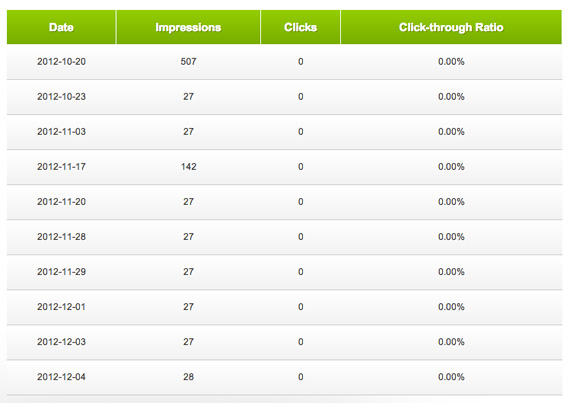
What you see above is the Banners Broker’s take on a ‘campaign report’.
So, let’s say I’m a professional media buyer.
Where do I find my breakdown of performance by creative? By channel? By hour? Where do I exclude targets (a damn near critical option for blind networks)?
Banners Broker tells the world that it is paying millions of dollars to its affiliates. Maybe that is the case. But the money is damn sure not coming from advertisers. I beg anybody to test this joke of a system and tell me otherwise.
Banners Broker and Clicksor
If we crawl through the heaps of misinformation on how Banners Broker actually serves its banners, it becomes clear that the company is brokering through Clicksor (a broker within a broker, if you will).
Clicksor is a legitimate company that I have worked with in the past. I’m sorry for sullying their names in the same sentence as Banners Broker, but we have to point out some crucial information:
In the latest 2011 data, Clicksor’s parent company Yesup Ecommerce Solutions Inc posted annual revenue of $17.5 Million dollars.
And yet Banners Broker claims to have paid out over $100 Million dollars, by brokering through Clicksor.
HOW?
Why is Banners Broker’s $100 Million in affiliate payouts not reflected in Clicksor’s accounts? They are receiving the same advertiser trade and they are further up the chain.
We would have to assume that Banners Broker is the only company working with Clicksor, and that Clicksor is the only part of Yesup producing revenue, and even then the maximum revenue pales in significance to what Banners Broker claims to be paying out to its affiliates. The markup must be astro-bloody-nomical.
It’s an economical impossibility.
Which is why Banners Broker has acted quickly to change its story.
David Hooker, BB’s latest snake-oil man, addressed this issue directly at the recent Irish gala.
“His presentation consisted of filling us in completely on how the Blind Network works and how it has 10 major Brokers running it. How Banners Broker linked up with the smaller of these Brokers (Finch: He stresses ‘smaller’ for good reason. He knows the previous numbers and ‘direct relationship’ clearly identified their model as a fraud)) and how now one of the largest Brokers has given green light to link with them. Chris later said that the linking up of software is almost complete and they will soon be good to go.”
If you know anything about advertising through a blind network, this is pretty hilarious.
What advertiser in his right mind is going to work with a broker that re-brokers through any 1 of 10 different networks? Why would the advertiser not just go direct to his broker of choice for half the price… and, screw it, some actual control over his ads?
It’s like me saying, “I want you to give me £1 for an ice cream that we both know you can buy for 50p. Except, I’m not even going to let you decide which ice cream you have. I’ll take that extra 50p and pick whichever of the 10 vans I want to buy it from (even though you may have a preference!). Then I’ll go to a bunch of investors and pitch them my breakthrough idea on the basis that brokering ice cream is the “next big thing” and billions are made every year by doing so. How about we ask for £3000 for the Black Cone Package – ‘Double your Cornettos, Magnums, and Twisters in a month!’ Yeah, pop-business. The proles will love that.“
There’s a problem with the model. People aren’t stupid! They know where they can get their ice cream for 50p, and they are not going to pay you double for less choice and poorer service. The same applies to the Banners Broker business model. Advertisers are not stupid. They are not going to pay Rajiv Dixit and Chris Smith more money in return for less ads and less control over where they appear.
In any case, who are these ’10 major brokers’ that Banners Broker has suddenly started working with? Why no names?
Tell us David, has Clicksor become the “smaller of these brokers” because you’ve been found out – publicly – by claiming to send your traffic through a network whose parent company reports only a tiny fraction of your own claimed revenues? I guess if you announce “10 major brokers” (conveniently without naming them), we can’t look in to their much more transparent workings and directly shoot your bullshit down for what it is.
It’s pretty obvious, isn’t it?
This is a lie aimed squarely at the bullet holes shot in the previous lie.
Note: We know that Banners Broker has been brokering solely through Clicksor because publisher.bannersbroker.com can be IP traced directly to a Clicksor server. Good luck split testing that with your 10 other brokers!
“Get Paid by Turtle Mail“
When working with reputable companies, you expect to also deal with reputable banks.
When working with Banners Broker, that is not the case.
Withdrawal requests are handled in one of three ways:
- The pre-paid BB card
- Solid Trust Pay (STP)
- Payza
The withdrawal methods vary from country to country, but it’s immediately clear that accessing your funds is not going to be as easy as it should be with a world renowned advertising company. There are no cheques, no direct deposit, not even a PayPal option!
With all due respect to Solid Trust Pay and Payza, their brands are known for dealing with the type of Internet businesses that can’t get approved anywhere else. They are staples of the HYIP community. And as for the pre-paid BB card (for some investors, their only option), this is the equivalent to being paid in cash.
You might as well be receiving an iTunes gift card.
Hey, give it 3 months and that will probably be the only payment option left.
There is absolutely no excuse for:
Withdrawal methods that require the user to jump through hoops with notarised ID before he can get his money.
Taking weeks, sometimes months, to process the bloody transactions in the first place. All the while charging the user on time every time for admin processing fees and traffic packs.
Banners Broker will take your money, but pay you only when they feel like it.
Which soon will be never.
They claim that their payouts are running smoothly with minimal backlog. A quick search of the Internet and that is clearly not the case. Selective payments rule the day.
The Tax Conundrum
A wise man once said, “The only thing certain in life is death and taxes.”
All money earned through Banners Broker is taxable, even the money that you haven’t yet withdrawn. Yes, your total account balance would be considered a form of stock in the eyes of the exchequer.
This leads to the rather awkward situation where Banners Broker investors need to be paying tax on income that they haven’t yet received. Failure to do so is in clear breach of the law (I’m referring to the UK, you will need to research this if you live elsewhere).
Let’s get this straight…
You are liable to pay tax on ALL of your “My Total Earnings” minus the costs accrued from account fees and buying traffic packs.
Your account might look like this:
Total Earnings: £15,000
Withdrawals So Far: £2,000
Invested in to the System (Total Costs): £3,000Total Earnings – Total Costs = Taxable Profits
£15,000 – £3,000 = £12,000Basic Tax Rate is 20%
(£12,000 x 0.20) = £2400 now due in tax.
So let’s say you have managed to withdraw £2000 from Banners Broker. You now need to pay the taxman £2400. Doesn’t sound like such a good investment, does it?
You are at a loss.
It’s not going to get better either! The Banners Broker system is designed to exponentially increase your My Total Earnings while allowing you to withdraw only a small fraction of your funds. It’s a bait ploy. But fatally, it assumes that you are the kind of person who doesn’t bother paying tax.
Well, do you?
With the January 31st deadline for self-assessment rapidly approaching, there are a lot of Banners Broker investors that are now required by law to hand ALL of their profits to the taxman while waiting for Banners Broker to pay the rest of their earnings.
Will that happen? Of course not.
If you don’t care about being involved in a ponzi scheme, I highly doubt you care about paying your taxes. But you should start thinking about it.
Lies, Lies, and More Lies
Troy Dooly recently posted an article on MLM Helpdesk writing off Banners Broker as a ponzi scheme. Here’s how Banners Broker chose to deflect the criticism:
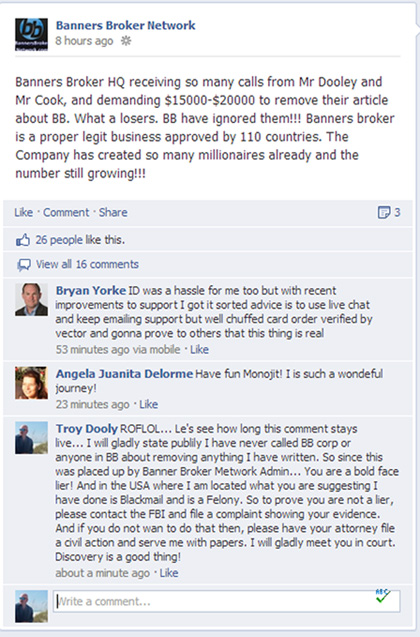
Yes, by falsely claiming that the article was written in an attempt to extort money in return for deletion.
Talk about a stroke of twisted genius. I hope Troy sues.
Here’s more from David Hooker on the subject of us pesky bloggers speaking critically of Banners Broker:
“He also talked about how he tackled the bloggers that were writing negative stuff. One was a friend of his and wanted Banners Broker to pay him £900 to correct his negative story!!!!
Another one, when offered the chance to come to BB International to see for himself what Banners Broker does, declined, and said he was broke!”
Hooker wisely opts not to name any names. If he did, he’d be sued to Kingdom Come.
This is the current tactic for deflecting criticism: accuse the blogger of trying to extort money. Well, if I hear even the slightest whisper that this article is written to extort money, I’ll be unleashing a lawyer so far up David Hooker’s arse that his next rousing presentation is delivered directly to a judge.
I guess rejecting all criticism as an attempt at extortion sums up the state of mind at Banners Broker HQ perfectly. What are they scared of in there?
Common Misconceptions
Let’s play some FAQ with the common responses from BB apologists. If you read the comments from the last post, you’ll already be familiar with the holding patterns and the dumbfounded logic.
I’m making XXXX/month from Banners Broker. It’s negative people like you who will never make money online! I’ve quit my job already!
I’ve said it so many times that my fingers are starting to resent the same keyboard bashing:
The fact that you have made some money from Banners Broker does not mean that it is anything less than a ponzi scheme. It just means that you are luckier than the poor suckers further down the food chain.
Important! The high balance in your account does not mean that the money is yours. It is text on a screen. A promise in a hurricane. The money is only yours when it lands in your bank account and for most people, this is the where the frustration begins.
Money withdrawal times are increasing. Payout methods are decreasing. Excuses are growing more and more ridiculous by the day.
Just because a page in cyberspace says that you have $17,000 waiting for you on the other side of the rainbow, that does not make it so. Weigh up how much money you have invested versus how much you have withdrawn. Now do an honest appraisal of the situation: “Have I really made money here? Or have I inherited a gigantic stack of IOUs?”
But I’ve met Chris Smith and Rajiv Dixit in person! A scammer would never show his face in person.
If you believe this, God help your wallet for it is ripeth to be plucked.
History is littered with ponzi schemers that travelled the world to sweet talk their prey. Take a look at Bernie Madoff. He hardly lived in the closet.
Why would a ponzi scheme go on a World Tour if it wasn’t credible?
Good question.
Let me rephrase it.
If Banners Broker is truly about a revolutionary advancement in the online advertising industry, why is the company touring for investors instead of advertisers?
It is advertisers who make the BB world spin round.
They are the ‘alleged’ heart of the business, the rainmakers if you will.
So why is there no evidence that a single Banners Broker advertiser exists? Why does Banners Broker spend its days trawling the world for fifty buck investors when its the big brand advertisers that pay the bills?
This company cannot survive without recruiting a large number of the most reckless advertisers under the sun (who also conveniently have the most extravagant budgets).
How do they recruit these elusive, nonchalant big-spenders (who don’t care which of the 10 networks you throw their ads on for twice the price)?
It’s certainly not by going on tour at advertising trade shows, or reputable conferences, or by offering a single interview to a reputable trade journal.
No, no.
The CEO of Banners Broker prefers to spend his time sharking across the dancefloor at Irish galas, eyeing up the next Primark suit for a Yellow Panel bonanza.

Sourced: http://www.realscam.com/f8/banners-broker-hyip-ponzi-scam-897/index123.html
He calls it networking. I call it a waste of bloody time for somebody who *allegedly* has much bigger fish to fry.
You don’t find Zuckerberg skirting for fifty bucks on the outskirts of Mumbai.
How can it be a ponzi? It doesn’t require referrals. I can make money without referring a single soul!
Practically every big player in Banners Broker is sitting on a mountain of referrals. It is the secret sauce behind their incomes.
True, you don’t have to refer people to join the program. But at this stage in the game, you are going nowhere fast if you choose to sit still, waiting for your panels to progress. This program is designed in such a way that dragging in more investors is the safest way to guarantee your own investment.
If you think the program can survive without referrals, you might want to consider this latest nugget from the Banners Broker blog:
“BB will be around as long as affiliates want to remain a part of the program”
Freud must be smiling in his grave.
Banners Broker is approved by MasterCard. Do you really think MasterCard would approve a ponzi scheme to use their cards?
This is such a nasty little lie that Banners Broker has been forced to tell its affiliates that, actually, there is no approval from Mastercard, and indeed no backing whatsoever. Banners Broker buys its pre-paid Mastercards from Vector, an independent reseller.
If you think there is a legitimate relationship between MasterCard and Banners Broker, I would advise that you keep it to yourself. Banners Broker are now so hypersensitive about this damaging lie that they are terminating the accounts of users who imply any such relationship exists.
If it was really a scam, it would have collapsed already.
There are some ponzi schemes that have lasted 20 years and there are others that have crashed and burned in 20 days.
If you believe that size or longevity defines a ponzi, let me assure you: it doesn’t.
It only defines how memorable the ultimate collapse will be.
In Summary: What is Really Happening?
For those of you who don’t have the time or attention to read all of the above, here is the bullet point breakdown of what is currently happening with Banners Broker, and what you can expect to happen over the coming months.
Your Panel Movements Will Grind to a Halt – Thousands of BB members are already reporting that their panels have been static for days, and that they have been slowing over the last few weeks. There’s a very simple explanation for this. Banners Broker doesn’t have the cashflow to pay what it owes, or to deliver the returns that it is promising you. Certainly not over the Christmas period where members are rushing to withdraw. Your panels are going to move slowly probably for the rest of Banners Broker’s very short-lived existence.
Withdrawals Will Continue to Take Forever – It’s not going to get better. The Banners Broker program is showing severe signs that it is overstretched. You don’t need me to tell you that withdrawal times are getting worse. Compare them to six months ago.
More ‘World Tours’ – Banners Broker is losing the online battle for publicity (with articles like my last swamping their brand at the top of Google), which is why it is throwing resources in to offline ‘tours’ as a means of recruiting new investors. This looks set to continue in to the new year with a tour of India planned. Will Banners Broker make it that far? I couldn’t possibly say. But if you’d like a long list of ‘deeply troubling questions’ to ask them in person, feel free to email me.
The Press Will Continue to Circle – The Sunday World has reported three negative stories in three weeks on Banners Broker. The Irish Examiner is also chiming in. I know for a fact that at least two major UK newspapers are interested in the fate of the scheme, as I’ve been speaking to them personally. Expect to hear lots more negative press about Banners Broker in the following weeks. The knives are being sharpened from all angles.
The Trolls, Shills & Pimps Will Blitz the Comments – The slightest hint of criticism and they always do. Just ask yourself, “What is their motivation?” If they were really making money from Banners Broker (and I’m sure some of them are), why do they care what anybody else thinks? The reason they defend this program so devoutly is because their future income depends on it. I hope that this post convinces you to think twice about your own.
Is Banners Broker ‘Definitely’ a Ponzi Scheme?
In my last post, I came to the judgment that Banners Broker is a well-disguised ponzi scheme. I stand by that judgment.
In the comments, I faced a lot of questions from readers who thought I couldn’t possibly say with ‘100% conviction’ that it is definitely a ponzi scheme. As much as it pains me to admit this, they are correct.
Theoretically, there is still a tiny chance that Banners Broker isn’t a ponzi scheme. Until the inevitable collapse, there remains a tiny shred of doubt.
The problem for those who back Banners Broker is that it is down to them to answer: “If Banners Broker isn’t a ponzi scam, what could it possibly be?”
The existing business model is riddled with flaws and impossibilities. There is simply no way that the money being paid to investors could have been delivered by online advertisers in the model that Banners Broker is claiming. Zero chance.
And that’s where this research ends.
If you believe that Banners Broker can operate as something other than a ponzi scam and deliver such spectacular returns, you are welcome to carry on believing, to keep on throwing your savings at the cause.
If, like many, you are coming to suspect the workings behind Banners Broker for something more sinister, you may wish to cancel your ticket to the BB World Tour, roll out your mock-Bannatyne accent and repeat this loud and clear:
“I’m out.“

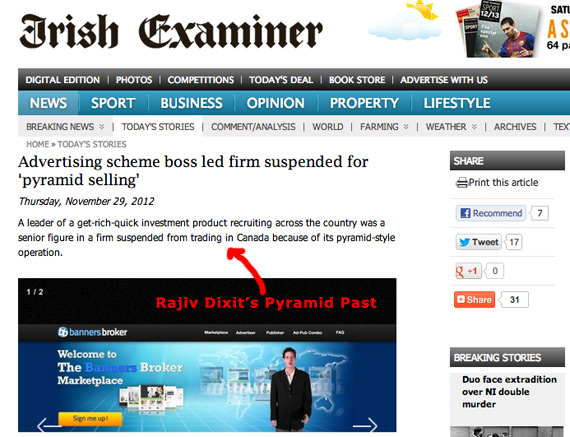
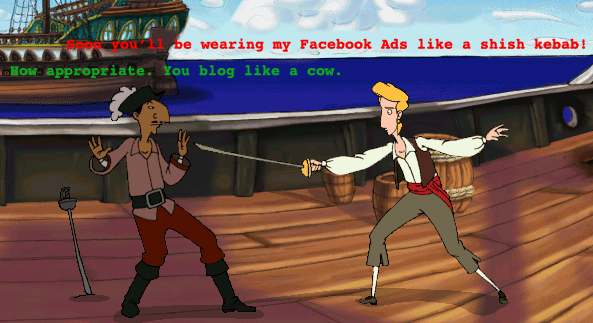
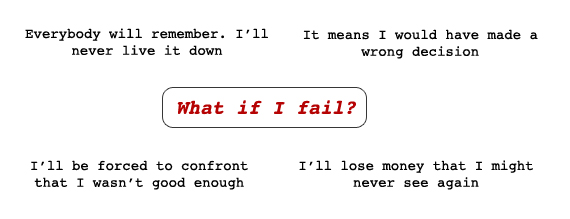
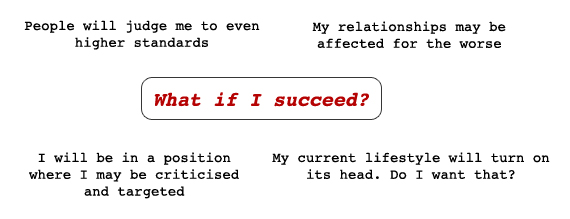
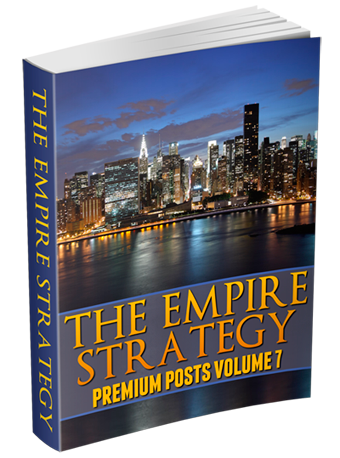
After refer your post I take in why banner broker site got huge scammed. In any case, investors properly understand…